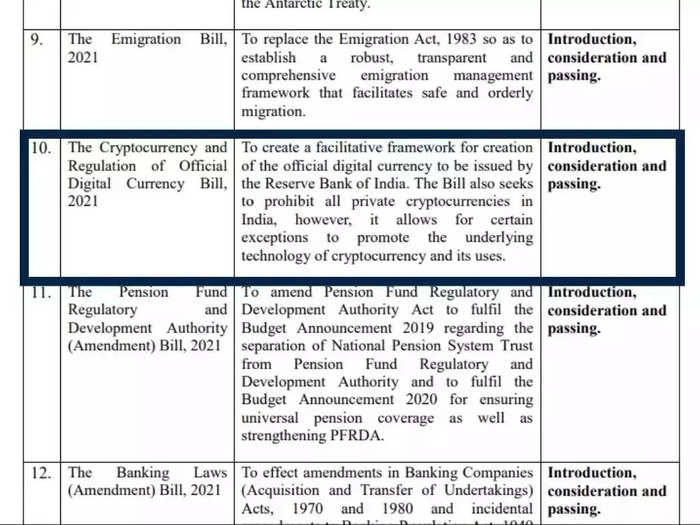Canva
- The Indian government is set to introduce a bill to ‘prohibit’ private cryptocurrencies.
- The bill will likely be introduced during the Winter Session of the Parliament.
- Here’s a look at how the rest of the world is regulating cryptocurrencies.
The Indian government is all set to introduce the Cryptocurrency and Regulation of Official Digital Currency Bill, 2021 during the
Winter Session of Parliament scheduled to kick off on November 29.
The bill aims at formulating a framework for creation of a digital currency that will be regulated by the Reserve Bank of India (RBI) and prohibition of
private cryptocurrencies in the country.
As India looks to reign in crypto currencies, here’s a look at the country’s earlier attempt to ban virtual currencies and how the rest of the world is regulating them.
The first ban on crypto
Unsplash
The Reserve Bank of India issued a circular in 2018 banning banks and NBFCs from dealing in virtual currencies and providing services for “facilitating any person or entity in dealing with or settling virtual currencies.”
Supreme Court
BCCL
In a relief to investors, the Supreme Court struck down the ban imposed by RBI, terming the circular as ‘unconstitutional’ as cryptocurrencies are not illegal in India.
India moves to prohibit private cryptocurrencies
Lok Sabha
The government has listed a bill that will be introduced in the parliament session that aims at prohibiting all ‘private’ cryptocurrencies, barring a few ‘exceptions’. This is the second time the bill has been listed.
The Indian government had earlier put in on the agenda of the Budget Session of Parliament in February, but it didn’t make the cut to come up for discussion.
Digital currency by RBI
Canva
The Reserve Bank of India is looking to introduce a digital currency that will be regulated by the central bank. Across the world, 83 countries, including Japan, China, and Russia are already working on implementing their own digital currencies.
United States
Canva
While the United States does not consider cryptocurrencies as a legal tender, exchanges are required to obtain a license to operate. The Internal Revenue Service (IRS) has classified cryptocurrencies as an asset for tax purposes. A recently passed infrastructure bill includes a provision for taxing crypto trades, however, the provision has attracted criticism for being vague.
China
Canva
China has banned crypto exchanges from operating in the country and has also imposed a ban on crypto mining. The country is currently working on a government regulated Digital Yuan to replace existing cryptos.
Russia
Unsplash
Russia has allowed crypto exchanges to operate in the country and investors can mine, hold and trade cryptos. However, they cannot use cryptos for payments. The government is also looking to create its own regulated digital currency.
South Korea
Pixabay
Crypto exchanges in South Korea require a license to operate and investors are free to invest and trade in crypto. The country is working on a tax code that seeks to levy 20% tax on income earned from crypto transactions over 2.5 million Korean won (₹1,56,600 approx.).
Japan
Canva
Japan recognises cryptocurrencies as legal property under the country’s Payment Services Act and exchanges are required to obtain a license to operate. The income from cryptos is classified as “miscellaneous income” and taxed accordingly.
European Union
Unsplash
While crypto regulations vary across different members of the union, virtual currencies are widely considered legal across the European Union. The Markets in Crypto-Assets Regulation was proposed in September which intends to regulate the crypto industry and propose licensing requirements.
Australia
Unsplash
Australia has classified cryptos as legal property and exchanges are allowed to freely operate after registering with the Australian Transaction Reports and Analysis Centre. Crypto gains are classified as capital gains and taxed accordingly.











